LGBTQI+
LGBTQI+
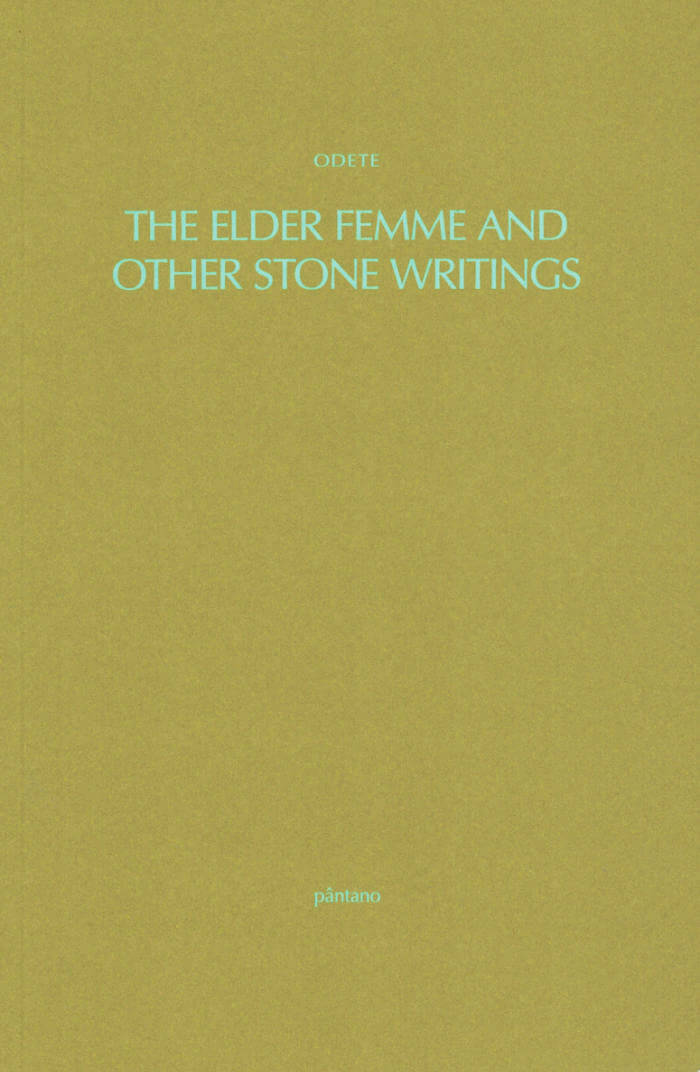
The Elder Femme and Other Stone Writings
The Elder Femme and Other Stone Writings is Odete’s first poetry collection. What starts as an essayistic archaeology searching for traces of transgender lives in mythical Antiquity soon branches off into myriad poetic and visual forms, from intimate free verses and scribbled notes to historical reports, earthy speculations, and magical enchantments. Weaving both English and her native Portuguese, there is a porosity and impermanence to Odete’s language. Equally evocative and testimonial, the book offers, in Odete’s own words, a “paranoid archaeology” that dilutes the borders between the personal and the collective. The Elder Femme works as portal, voicing those that came before and those still to come, as in its opening poem: “one day/ i’ll thank her/ my mother/ for teaching me/ how to glue/ shattered vases”.
Odete is a multidisciplinary artist working between the fields of music, visual arts, writing, performance, and theatre, born in Porto in 1995. Her writings have previously appeared in Trains Magazine, Tranfeminist Zine, and others. Her work in music includes the edited EPs and albums THE CONSEQUENCES OF A BLOOD LANGUAGE (Genome 6.66 Mbp, 2021); Water Bender (New Scenario, 2020); For those who are bored paranoid(Self-release, 2019); Mooring (Rotten: Fresco, 2019); and Matrafona(Naivety, 2018). Her performances have been presented at Teatro São Luiz (Lisbon), CTM Festival (Berlin), BOCA Biennial of Contemporary Arts, MAAT Museum (Lisbon), Galeria Municipal do Porto (Porto), and Teatro Municipal Campo Alegre (Porto). In 2020 she won the ReXform Award for performing arts, from which resulted the project On Revelations and Muddy Becomings on which her first book is based.
Published 2021.
150 copies, first edition, original in English and Portuguese bilingual

Edgewise: A Picture of Cookie Mueller
Contributions by John Waters, Mink Stole, Gary Indiana, et al.
Cookie Mueller was a firecracker, a cult figure, a wit, a wild child, a writer, a go go dancer, a mother, an unlikely queer icon, an alchemist, a lightning rod in dark times. A child of suburban 50‘s Maryland and post-beatnik 60’s freakdom, she made her name first as an actress in the films of John Waters, and then as an art critic and columnist, a writer of hilarious and sublime stories and short fiction and a maven of the Downtown art world. Edgewise tells the story of Cookie‘s life through an oral history composed from over 80 interviews with the people who knew her. After tracing back some of the steps of the author’s 7-year trip in search of Cookie, the voices take us from the late 60’s artist communes of Baltimore to 70’s Provincetown where romantics and queers crawled the dunes and discos, to the sleepless creative high of post-industrial Bohemian New York, through 80‘s West Berlin and Positano, and into the depths and contradictions of Cookie’s life and loves.
Since her death from AIDS in 1989, Cookie’s work and life have made her an underground icon. Her original texts, first published by Hanuman Books and Semiotext(e), have been reprinted by Serpent’s Tail, and she is remembered for her appearances in the No Wave films and theater of Amos Poe, Michel Auder, Gary Indiana and others.
Along with the text, Edgewise consists of original artwork, unpublished photographs and archival material, and photo contributions by Philip-Lorca DiCorcia, David Armstrong, Robert Mapplethorpe, Peter Hujar and others.
Edgewise is a meditation on memory and story-telling.

The Well-Dressed Wound
A gleeful grotesquerie and savage satire, featuring Abraham and Mary Todd Lincoln and the Devil, along with Civil War dead, deconstructed couture, and gay ghosts.
The Well-Dressed Wound is Derek McCormack's play script "séance" a fashion show by the dead for the living. In the depths of the Civil War, in a theater in P. T. Barnum's American Museum on Broadway, Abraham and Mary Todd Lincoln participate in a staged spiritualistic rite. But the medium conducting them has invited along another being: the Devil, disguised as twentieth-century French fashionista Martin Margiela (aka "King Faggot"). What follows is the most fiendish runway show ever mounted, complete with war dead, deconstructed couture, and gay ghosts infected with all manner of infectious agents, including oozy AIDS.
While his previous fictions have explored the darker corners of country music, high fashion, and camp, The Well-Dressed Wound is McCormack's most radical work yet, occultishly evoking the evil-twin muses of transgressive literature, Kathy Acker and Pierre Guyotat. The creation thus conjured is a gleeful grotesquerie, a savage satire not so much of fashion as of death, a work that, as Bruce Hainley observes in Artforum, puts "the 'pus' back in opus." Here death and life spin on a viral double helix of contamination and couture, blistering and bandages, history and hysteria, semen and seams. "Being dead is so very now," Hainley opines. "This tiny tome (a time bomb, a tomb) is to die for and radically alive."

The Queer Art of Failure
The Queer Art of Failure is about finding alternatives—to conventional understandings of success in a heteronormative, capitalist society; to academic disciplines that confirm what is already known according to approved methods of knowing; and to cultural criticism that claims to break new ground but cleaves to conventional archives.
Jack Halberstam proposes “low theory” as a mode of thinking and writing that operates at many different levels at once. Low theory is derived from eccentric archives. It runs the risk of not being taken seriously. It entails a willingness to fail and to lose one’s way, to pursue difficult questions about complicity, and to find counterintuitive forms of resistance.
Tacking back and forth between high theory and low theory, high culture and low culture, Halberstam looks for the unexpected and subversive in popular culture, avant-garde performance, and queer art. Halberstam pays particular attention to animated children’s films, revealing narratives filled with unexpected encounters between the childish, the transformative, and the queer. Failure sometimes offers more creative, cooperative, and surprising ways of being in the world, even as it forces us to face the dark side of life, love, and libido.
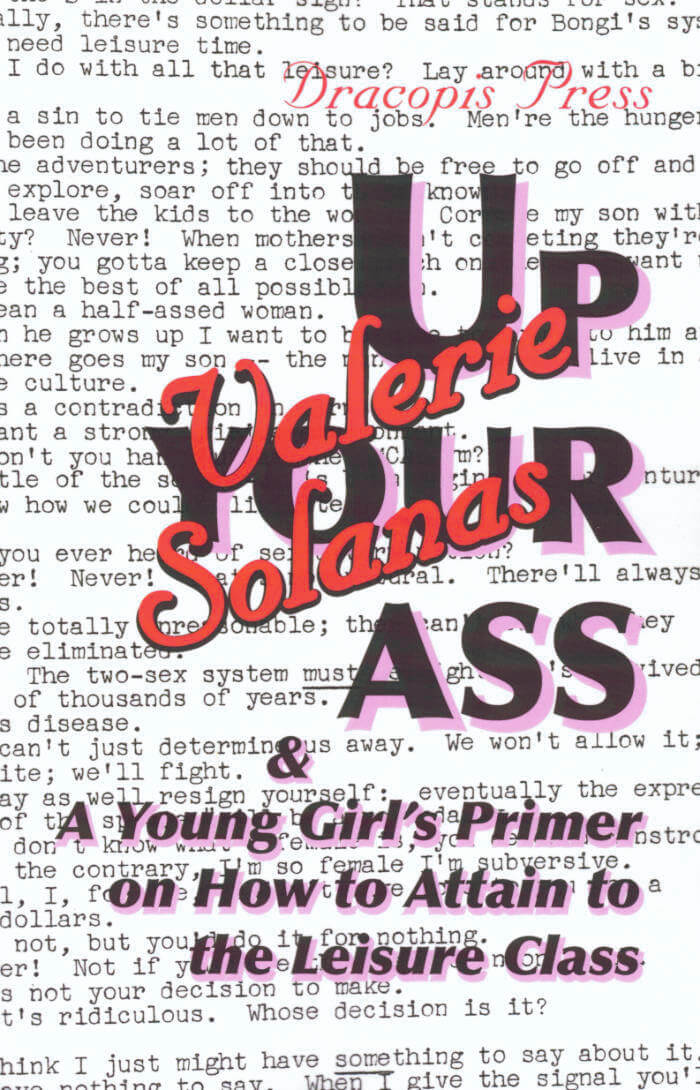
Up Your Ass; And a Young Girl's Primer on How to Attain to the Leisure Class
"I'm so female I'm subversive." Valerie Solanas.
This volume presents two rarities of Valerie Solanas. The legendary play "Up Your Ass, or, From the Cradle to the Boat, or, The Big Suck, or, Up From the Slime" (1965/1967). And the story "A Young Girl's Primer on How to Attain to the Leisure Class" (1966).
Readers of SCUM Manifesto! Behold as the literary heritage of Valerie Solanas redoubles before your eyes.
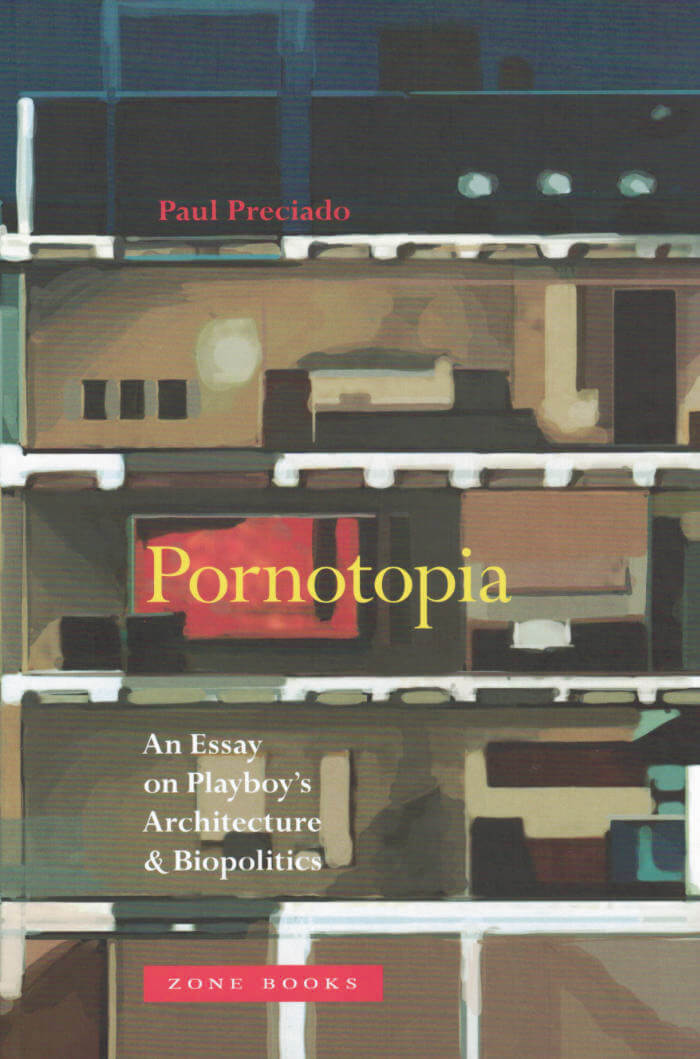
Pornotopia
Published for the first time in 1953, Playboy was not only the first pornographic popular magazine in America; it also came to embody an entirely new lifestyle through the construction of a series of utopian multimedia spaces — from the Playboy Mansion and fictional Playboy's Penthouse of 1959 to the Playboy Clubs and hotels appearing around the world in the 1960s. Simultaneously, the invention of the contraceptive pill provided access to a biochemical technique that separated (hetero) sexuality and reproduction.
Addressing these concurrent cultural shifts, Paul Preciado investigates the strategic relationships between space, gender, and sexuality in popular sites related to the production and consumption of pornography that have tended to reside at the margins of traditional histories of architecture: bachelor pads, multimedia rotating beds, and design objects, among others.
Combining historical perspectives with contemporary critical theory, gender and queer theory, porn studies, the history of technology, and a range of primary transdisciplinary sources — treatises on sexuality, medical and pharmaceutical handbooks, architecture journals, erotic magazines, building manuals, and novels — Pornotopia explores the use of architecture as a biopolitical technique for governing sexual relations and the production of gender in the postwar United States.
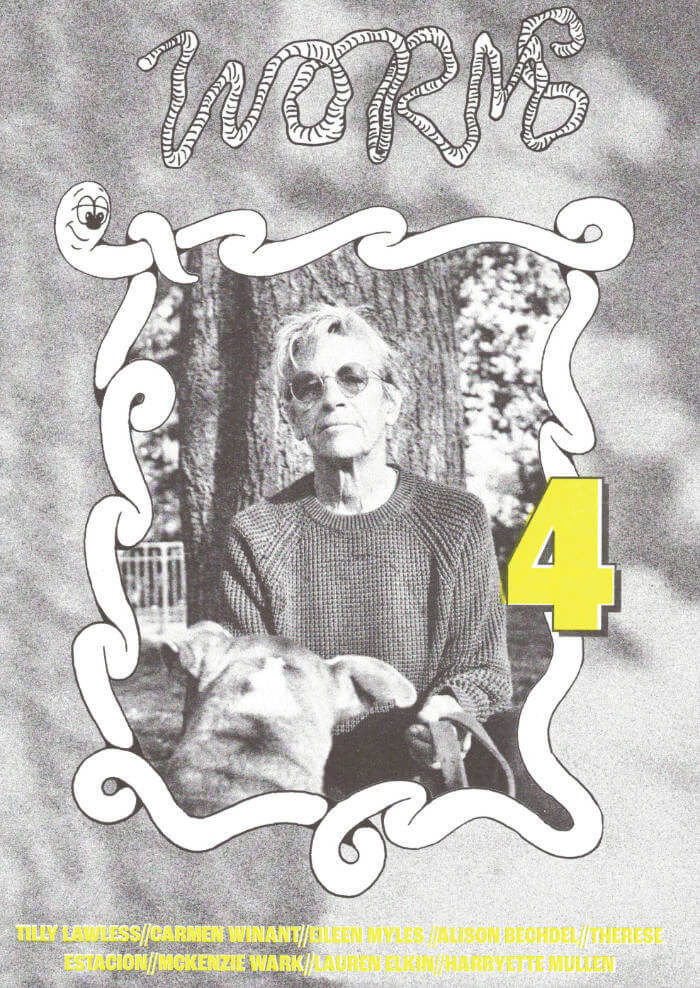
Worms #4 'The Flaneuse'
Worms #4 looks at psychogeography and the Situationists from a non-male perspective. Taking flâneuserie and the creative benefits of a good walk as its starting point, the issue features conversations with Eileen Myles, Alison Bechdel, Lauren Elkin, Tilly Lawless, Mckenzie Wark, Therese Estacion and Carmen Winant. 2021 was a fraught year for walking; the pandemic restricted our right to movement, while the murders of women walking in London led us to ask the question: how can the act of walking the streets spark political conversation?
Also included with this issue is an affirmation booklet in collaboration with @somuchluvindisclub
Worms is a biannual literary style magazine that celebrates female and non-binary writer culture.
‘If you’re reading this, you are a worm. We’re all worms, and in the end, we’re going to be eaten by them. As a (book)worm, you will fertilize your mind with glorious words…’
Founded in 2019 by Clem Macleod during her degree at Central Saint Martins, Worms began with a mad, spiralling obsession with the late Kathy Acker.

Transgender Warriors: Making History from Joan of Arc to Marsha P. Johnson and Beyond
This groundbreaking book, far ahead of its time when first published in 1996 and still galvanizing today, interweaves history, memoir, and gender studies to show that transgender people, far from being a modern phenomenon, have always existed and have exerted their influence throughout history. Leslie Feinberg, hirself a lifelong transgender revolutionary, reveals the origin of the check-one-box-only gender system and shows how zie found empowerment in the lives of transgender warriors around the world, from the Two Spirits of the Americas to the many genders of India, from the trans shamans of East Asia to the gender-bending Queen Nzinga of Angola, from Joan of Arc to Marsha P. Johnson and beyond.

Cruising Utopia: the Then and There of Queer Futurity
A 10th anniversary edition of this field defining work—an intellectual inspiration for a generation of LGBTQ scholars
Cruising Utopia arrived in 2009 to insist that queerness must be reimagined as a futurity-bound phenomenon, an insistence on the potentiality of another world that would crack open the pragmatic present. Part manifesto, part love-letter to the past and the future, José Esteban Muñoz argued that the here and now were not enough and issued an urgent call for the revivification of the queer political imagination.
On the anniversary of its original publication, this edition includes two essays that extend and expand the project of Cruising Utopia, as well as a new foreword by the current editors of Sexual Cultures, the book series he co-founded with Ann Pellegrini 20 years ago. This 10th anniversary edition celebrates the lasting impact that Cruising Utopia has had on the decade of queer of color critique that followed and introduces a new generation of readers to a future not yet here.
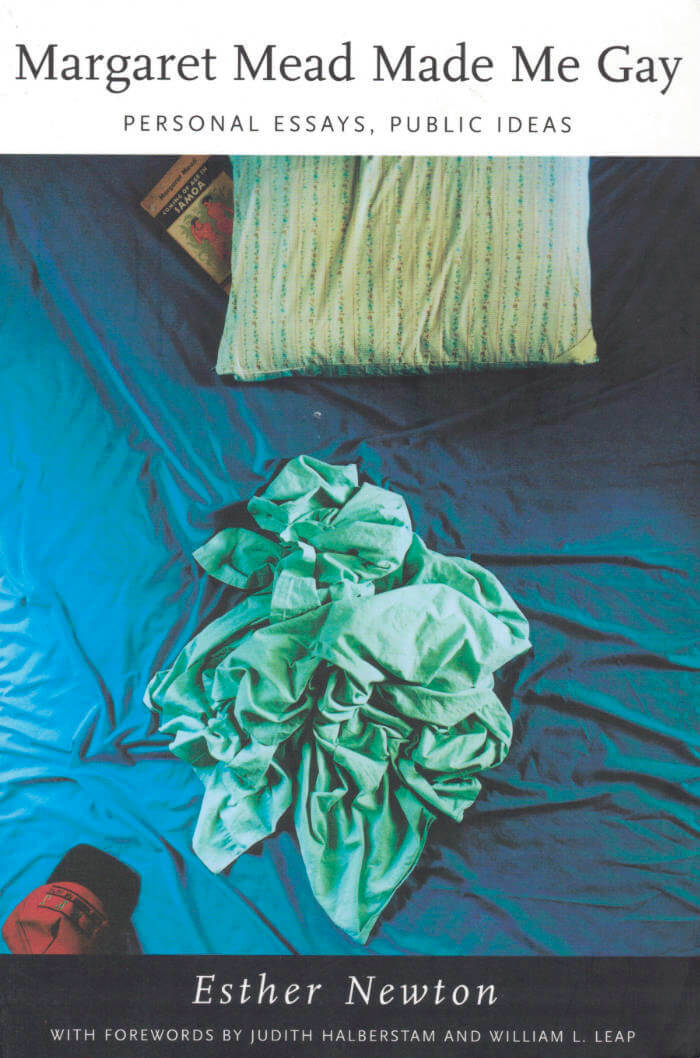
Margaret Mead Made Me Gay: Personal Essays, Public Ideas
Margaret Mead Made Me Gay is the intellectual autobiography of cultural anthropologist Esther Newton, a pioneer in gay and lesbian studies. Chronicling the development of her ideas from the excitement of early feminism in the 1960s to friendly critiques of queer theory in the 1990s, this collection covers a range of topics such as why we need more precise sexual vocabularies, why there have been fewer women doing drag than men, and how academia can make itself more hospitable to queers. It brings together such classics as “The Mythic Mannish Lesbian” and “Dick(less) Tracy and the Homecoming Queen” with entirely new work such as “Theater: Gay Anti-Church.”
Newton’s provocative essays detail a queer academic career while offering a behind-the-scenes view of academic homophobia. In four sections that correspond to major periods and interests in her life—”Drag and Camp,” “Lesbian-Feminism,” “Butch,” and “Queer Anthropology”—the volume reflects her successful struggle to create a body of work that uses cultural anthropology to better understand gender oppression, early feminism, theatricality and performance, and the sexual and erotic dimensions of fieldwork. Combining personal, theoretical, and ethnographic perspectives, Margaret Mead Made Me Gay also includes photographs from Newton’s personal and professional life.
With wise and revealing discussions of the complex relations between experience and philosophy, the personal and the political, and identities and practices, Margaret Mead Made Me Gay is important for anyone interested in the birth and growth of gay and lesbian studies.

Testo Junkie
What constitutes a real man or woman in the twenty-first century? Since birth control pills, erectile dysfunction remedies, and factory-made testosterone and estrogen were developed, biology is definitely no longer destiny.
In this penetrating analysis of gender, Paul B. Preciado shows the ways in which the synthesis of hormones since the 1950s has fundamentally changed how gender and sexual identity are formulated, and how the pharmaceutical and pornography industries are in the business of creating desire. This riveting continuation of Michel Foucault's The History of Sexuality also includes Preciado's diaristic account of his own use of testosterone every day for one year, and its mesmerizing impact on his body as well as his imagination.
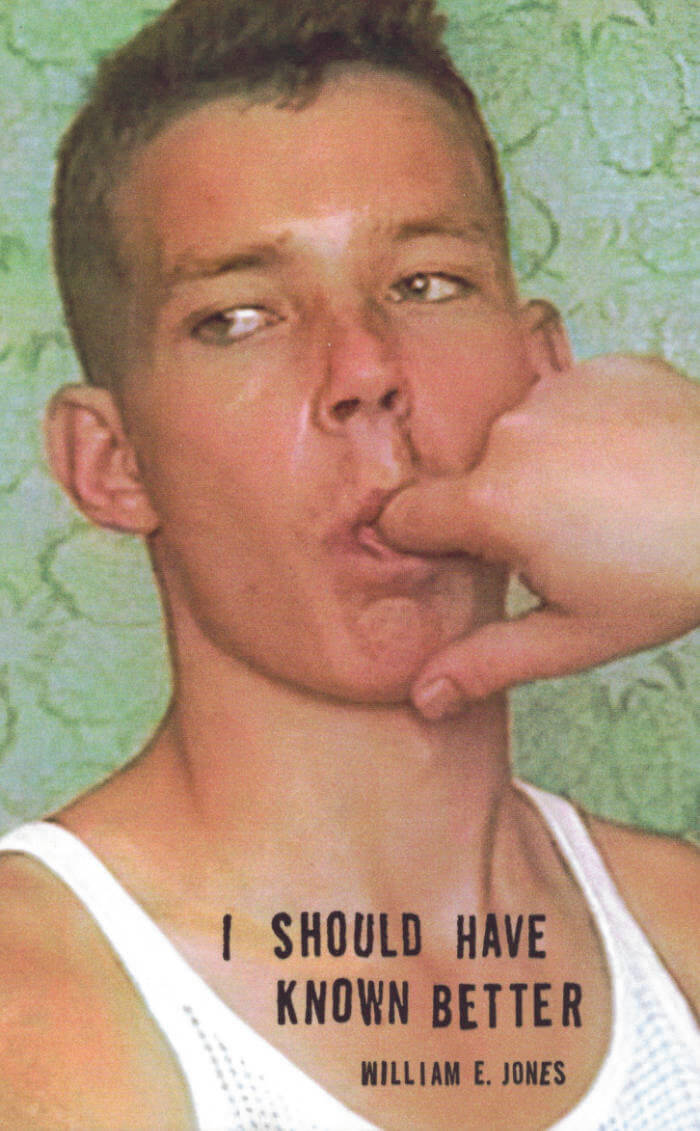
I Should Have Known Better
I Should Have Known Better is a sequel to the sleeper hit I'm Open to Anything (2019), expanding the original's scope and ambition.
I Should Have Known Better's first person narrator, while working at a dead-end job in Los Angeles during the mid-1990s, reconnects with his best friend Moira, recently returned from Central America, and makes a new friend, Bernie, who teaches the history of photography. The two of them convince him to pursue a master's degree as a way of escaping the unrewarding life of a video store clerk. Once the narrator is exposed to an academic environment, he takes a dim view of the education that art school has to offer, but is happy to meet a group of talented fellow students who become close friends. He encounters a number of art world figures, ranging from the brilliant to the abject, who disabuse him of his illusions. The narrator has his most instructive experiences off campus, especially a love affair with the handsome and mercurial Temo, an insolent rich kid who leads a double life. Together they explore their sexual limits in scenes of bracing explicitness. I Should Have Known Better bears witness to the last gasp of Los Angeles bohemia at the end of the twentieth century.
The novel paints precise portraits of inspired eccentrics devoted to pursuing their dreams, "shopping artists" who believe in nothing but hedonism, and latter-day leftists who find themselves directionless after the fall of communism. Above all, the book pays tribute to the impulsive experiments and intense friendships of youth.
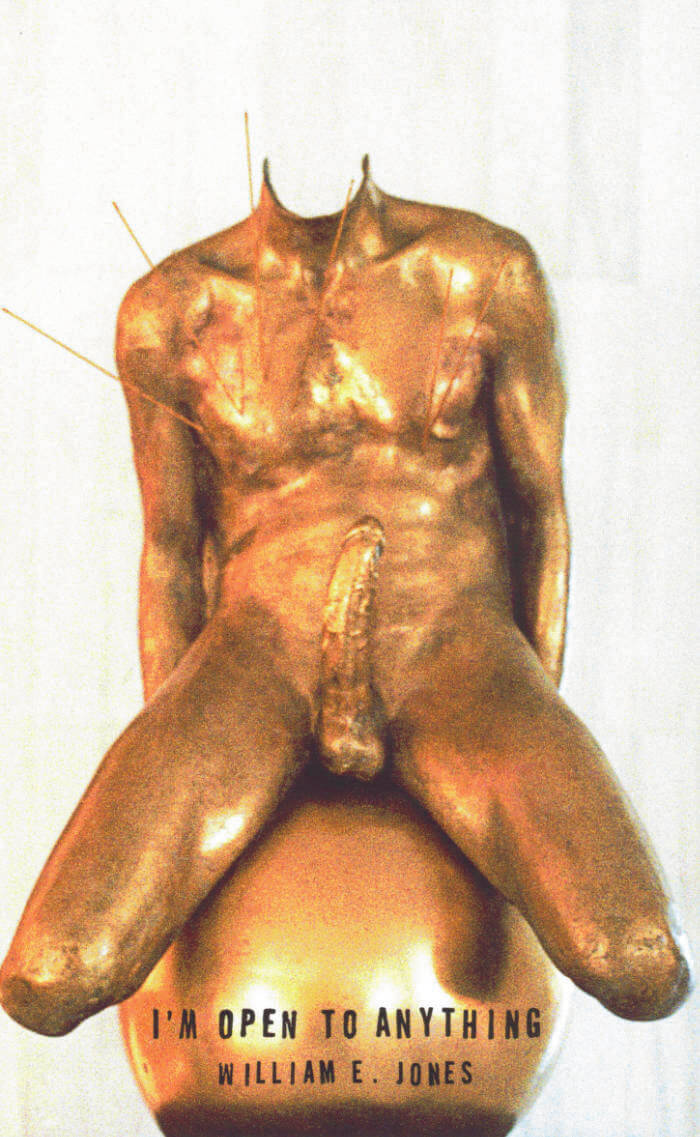
I'm Open To Anything
A perverse and explicit new take on the coming of age novel, William E. Jones's I'm Open to Anything explores bohemian Southern California of the late 1980s and early 90s, before gentrification ruined everything.
The book's narrator flees a crumbling industrial wasteland in the Midwest and finds himself in sunny Los Angeles without a car, working in a neighborhood video store and spending many hours watching films. He explores his adopted city and befriends a number of men, most of them immigrants, who teach him the finer points of sex. He acquires the skill of fisting, giving his partners intense pleasure, and at the same time hearing the stories of their lives. They too have fled their hometowns: one to escape torture at the hands of a Salvadoran death squad; another to study anthropology after years of wandering and religious questioning.
Alternating between explicit scenes of kinky sex and intimate conversations about matters of life and death, I'm Open to Anything is a porno novel of rare ambition and humor. The book recalls Olympia Press's heyday, when authors made quick money churning out dirty books, but couldn't hide the intellectual obsessions that made them writers in the first place.
William E. Jones's previous book, True Homosexual Experiences (also published by We Heard You Like Books), a biography of Straight to Hell's iconoclastic editor Boyd McDonald, celebrates the frank, raunchy language of the first queer 'zine. Jones brings the same unsparing and profane attitude to I'm Open to Anything, his debut novel.
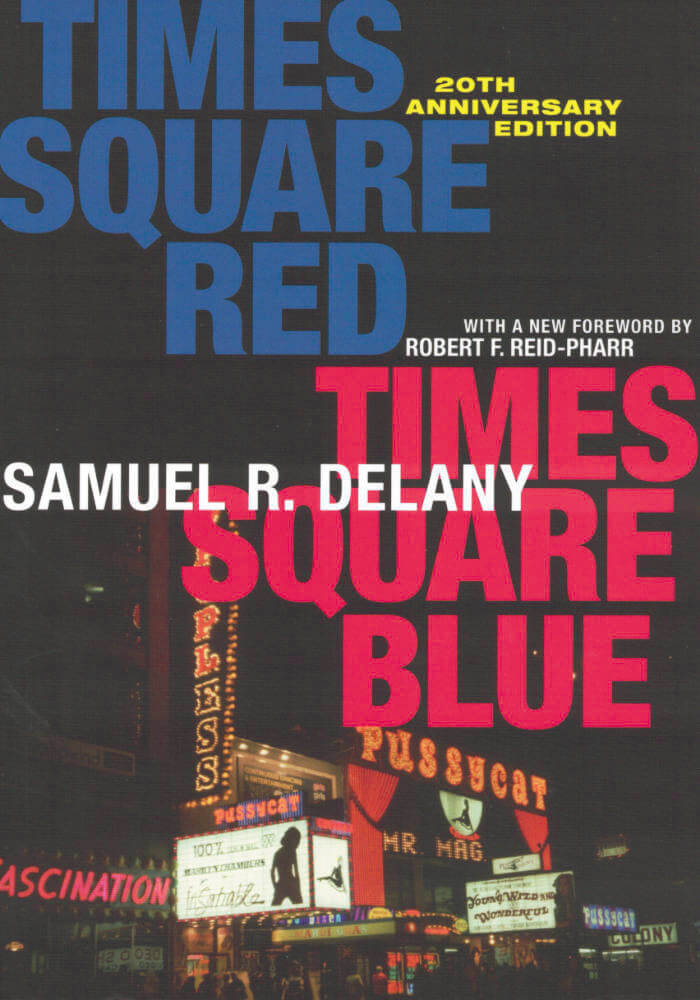
Times Square Red, Times Square Blue
Times Square Red, Times Square Blue is a non-fiction book written by science fiction author Samuel R. Delany and published in 1999 by the New York University Press.
The book is a compilation of two separate essays: Times Square Blue and ...Three, Two, One, Contact: Times Square Red.
This 20th Anniversary Edition contains an introduction by Robert Reid-Pharr.
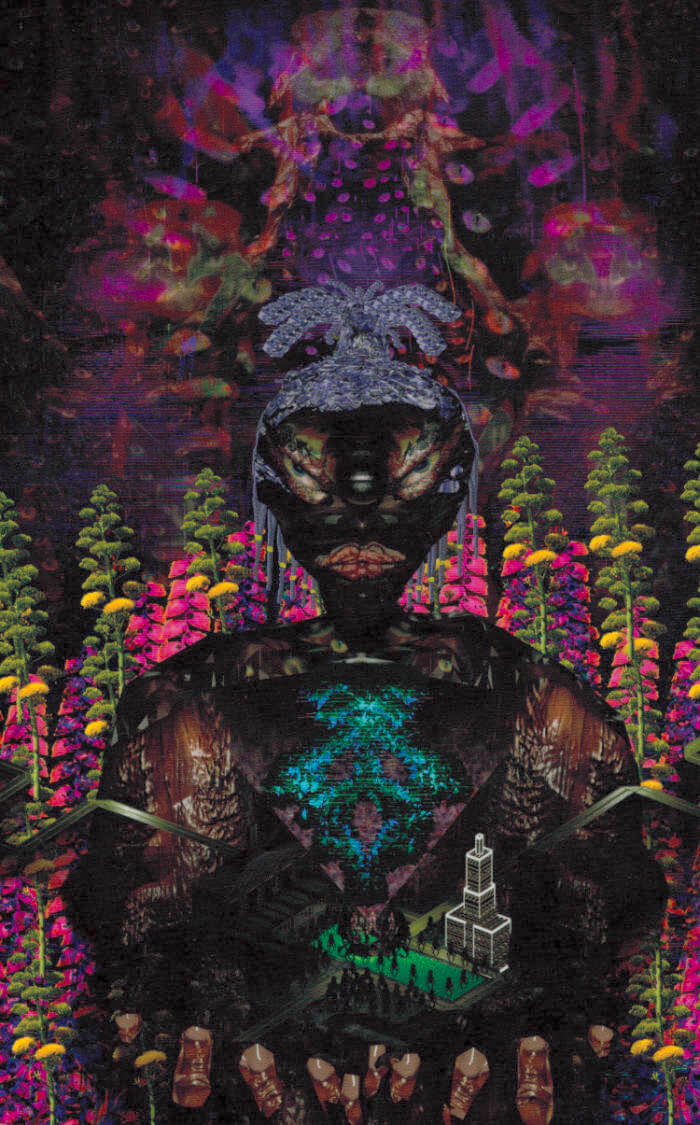
The Virosexuals
Manchester, UK. 2080.
It is a subculture whereby people are sexually attracted to the idea of transmitting and receiving STI’s. It started as a counter-culture against computer algorithms that determine every aspect of people’s lives, from careers to romantic interests, where they live, all over the world. The Virosexuals decided to alter their own bodies in order to subvert the algorithm. Now treated as non humans and thus ignored, Virosexuals like Amygdala are left to survive on their own…
Amygdala’s world consists of: her open relationship with Cel, her philosophical musings and drugged-up rants with her best friend Skunk/Winny, as well as her pursuit of all the completely curable (and thus fetishised) meatspace ‘zeases the club scene can offer. She tries to negotiate her body, her sexuality and her desires and find the source of the ‘Petitmort' threat…!
Amygdala’s dealer ran off on her. She’s out of estrogen, and so when Alejandro offers her a bountiful supply of ‘mones if she works for him – doing what? – she’s not super sure… What she does know: ESCHATOS 2.0 is trying to kill her. There’s a rumour buzzing on The Chat. A deadly virus, nicknamed ‘Petitmort’, is going around. It was manufactured by ESCHATOS 2.0, and maybe only those who have installed the latest update of the Treehouse Link are susceptible. Could Alejandro’s mission for Amygdala be connected to this virus sweeping the underground kink and BDSM scene?
Orion J. Facey's The Virosexuals, the author’s first novel, is a science-fantasy you won’t regret plugging into.
The Book Cover is Artwork by Danielle Brathwaite-Shirley
Design and Typeface by Atelier Carvalho Bernau
Editing by Taylor Le Melle
Copy Editing by Natasha Lall
Production by Daniella Valz Gen, Ima-Abasi Okon and Rehana Zaman
Pages: 280
Dimensions: mm × mm
Published: 30 June 2021
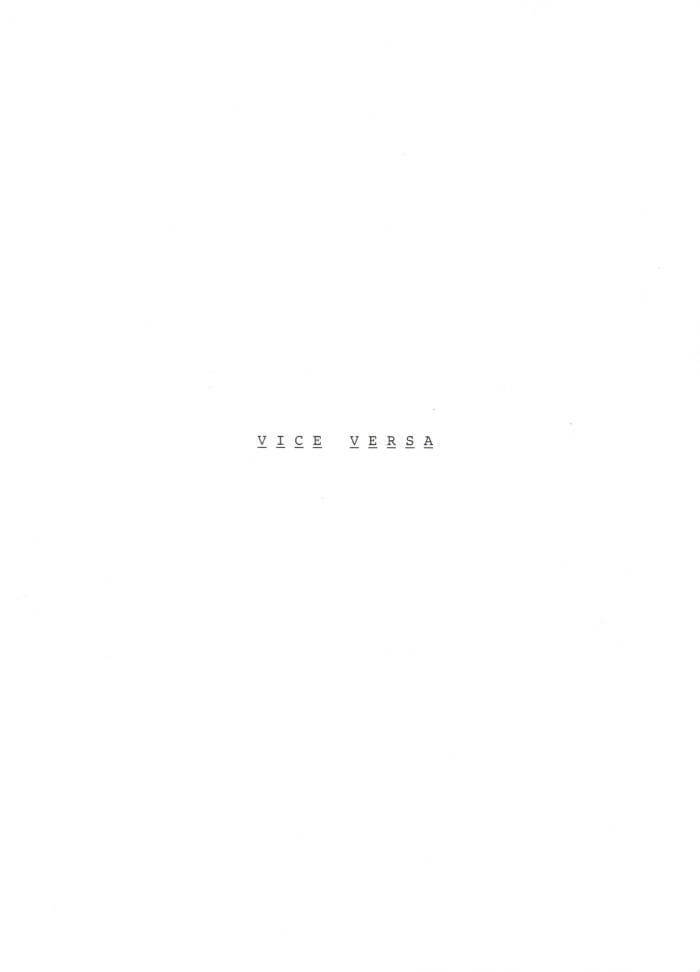
Vice Versa — America's Gayest Magazine
Vice Versa is on of the first known lesbian magazine in the world. Lisa Ben wrote, edited, printed and distributed the magazine for nine months in Los Angeles in the late 1940s. This publication gathers the nine issues she has published.
Lisa Ben explained in an interview: "I would type it out during working hours. I had never enough work—I was a fast typist. And my boss would say: 'Well, I don't care what you do if your work is done. But I don't want you to there and knit or read a magazine... I want you to look busy.' So I had plenty to keep me busy and that's how I put together VICE VERSA... I used the office stapling machine. I used the manila folders form the office, and I didn't feel a bit guilty about it! I should have, but I didn't."

Some Styles of Masculinity
An intimate, urgent and riotous account of masculinity, whiteness, queerness and belief in America.
In winter 2018, Gregg Bordowitz performed a three-part lecture series at the New Museum as part of Trigger: Gender as a Tool and a Weapon. Each evening, he explored an avatar of masculinity that was formative to him as he came of age as an outer-borough child of Jewish immigrants, then as an artist-activist in Manhattan at the dawn of the AIDS crisis: the rock star, the rabbi and the comedian. He merged personal and political history, ribald humor and social criticism, performer and persona.
Some Styles of Masculinity is a self-portrait and an essay on upheaval and plague, based on transcripts of the eponymous series, which Bordowitz has reimagined for the page. He asserts that gender can't be separated from ethnicity, sexuality, class or nationality, and he connects these aspects of himself through personal anecdotes as well as reflections on whiteness, diaspora, comedy and Jewish mysticism. Some Styles of Masculinity evokes David Antin's "talk poems," Maggie Nelson's "autotheory," David France's How to Survive a Plague and Wayne Koestenbaum's casually erudite criticism. This book is a winding, intimate, urgent, freewheeling account of thinking and enduring in difficult times.
Gregg Bordowitz (born 1964) is the author of Glenn Ligon: Untitled (I Am a Man) (2018), General Idea: Imagevirus (Afterall Books, 2010) and The AIDS Crisis Is Ridiculous and Other Writings, 1986-2003 (2004). He was an early participant in ACT UP (AIDS Coalition to Unleash Power), where he cofounded several video collectives.
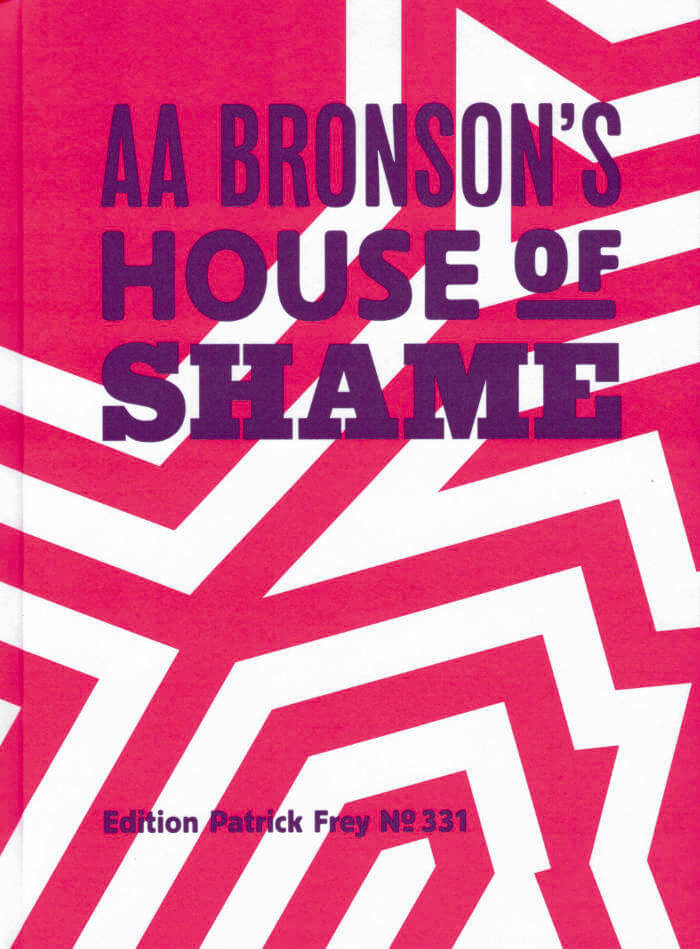
AA Bronson's House of Shame
A look back in text and images at AA Bronson 's (collective) production between 2013 and 2018.
A nocturnal secret ritual performed by two naked men in a hotel room in the Netherlands; a woven tent where the artist dressed as a mage encounters visitors to share their traumas; buttplugs adorned with rooster feathers; a collection of queer zines; anal-sprayed tartan paintings; a zen garden of mugwort. A few of the singular artistic gestures AA Bronson committed in the last few years are united in this book.
After his General Idea partners, Felix Partz and Jorge Zontal, passed away in 1994, AA Bronson had to learn how to keep on living by himself, inventing a personal identity without his former companions, creating a new community of work, friendship and love. These issues have been at the core of his art in the last 25 years. He has developed a work where collaboration with other artists, especially younger queer artists, and creation of a social bond are central.
AA Bronson's House of Shame aims to emphasize this social dimension in his work through an overview of a series of exhibitions he made between 2013 and 2018. These are shows that bring together a community of artists; shows where performances and rituals, often invisible, contribute to the creation of a shared experience; a unique blend of art, friendship, collaboration, spirituality and humour.
The book is in two-parts. An initial monographic section, which includes an essay and an interview with the artist, brings together the works and the exhibitions. In the second, choral part, friends have been invited to bear witness and write a sort of 'journal de bord,' telling the tale of five years of the artist's community life.
With a foreword by Vincent Simon, a text by Paul Clinton, and an interview by Frédéric Bonnet, and contributions from Philip Aarons, Defne Ayas, Elijah Burger, Matthias Herrmann, Richard John Jones, Bradford Kessler, Terence Koh, Sholem Krishtalka, Mark Jan Krayenhoff van de Leur, Gareth Long, Chrysanne Stathacos, Scott Treleaven, and Louwrien Wijers.

Cruiser L'Utopie
First French translation of José Esteban Muñoz's field defining work—an intellectual inspiration for a generation of LGBTQ scholars.
Cruiser l'utopie describes a movement, a drifting advance between theory, philosophy, art criticism and personal narrative. The works cited, narrated, are mixed with family or individual narrative and more academic considerations. This practice of queer theory and aesthetics is part of a new interpretation of hope as perceived by philosopher Ernst Bloch, articulated with black radical thought and the poetic research of authors such as Fred Moten and Eileen Myles.
Muñoz focuses here on the period of the Stonewall revolts (New York, 1969) and analyzes, for example, the works of Frank O'Hara, King Jone/Amiri Baraka, Andy Warhol, Kevin Avance, Samuel R. Delany, Fred Herko, Jill Johnston, Ray Johnson. Queer theory as a study has a new way of researching and writing, a form of hybridity between philosophy and cultural studies. The critique is, as if by anticipation, contained in the counter-normative artistic practice and daily life whose narratives, both subjective and historical, hint at a queer future, a place of transformation and liberation.
The text, translated from English by Alice Wambergue, is accompanied by a preface by Elisabeth Lebovici and a poem by Fred Moten.
José Esteban Muñoz (1967 - 2013) is a queer scholar and art theorist. Author of The Sense of Brown (published posthumously in 2020), Cruising Utopia, the Aftermath and Elsewhere of Queer Advent (2009), and Disidentifications: Queers of Color and the Performance of Politics (1999), he edited the collective works Pop Out: Queer Warhol (1996) and Everynight Life: Culture and Dance in Latin/o America (1997). Muñoz has long taught in the Department of Performance Studies at New York University's Tisch School of the Arts and edited the Sexual Cultures series at New University Press, where he has published works such as Jack Halberstam and Samuel Delany.
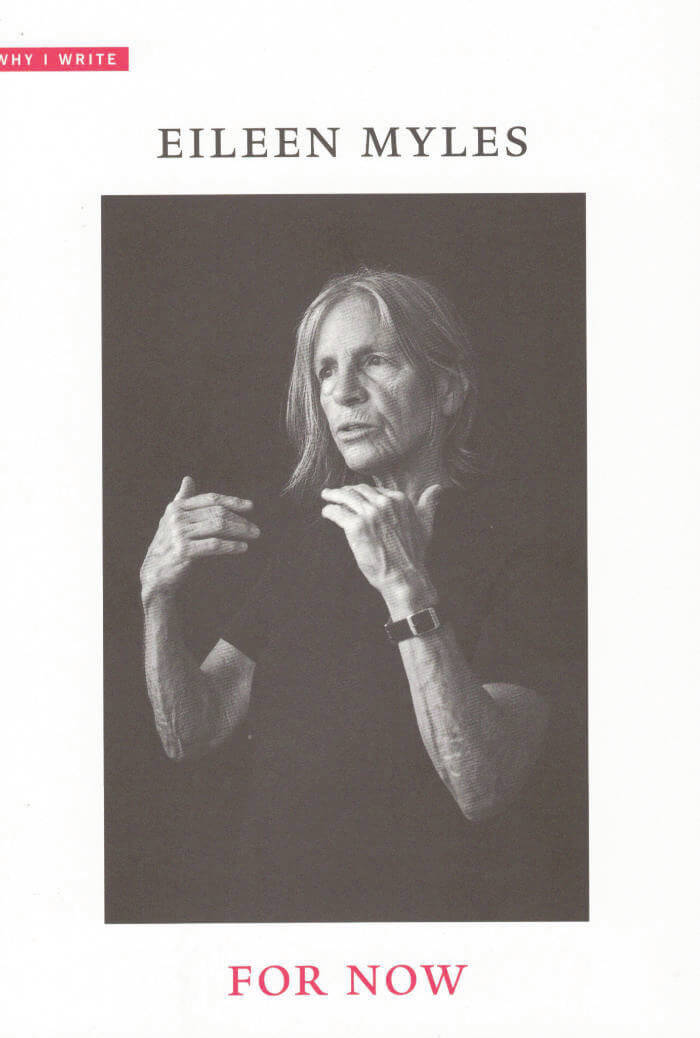
For Now (paperback)
In this third Why I Write volume, Eileen Myles addresses the social, political, and aesthetic conditions that shape their work.
In this raucous meditation, Eileen Myles offers an intimate glimpse into creativity's immediacy. With erudition and wit, Myles recounts their early years as an awakening writer; existential struggles with landlords; storied moments with neighbors, friends, and lovers; and the textures and identities of cities and the country that reveal the nature of writing as presence in time.
For Myles, time's "optic quality" is what enables writing in the first place, as attention, as devotion, as excess. It is this chronologized vision that enables the writer to love the world as it presently is, lending love a linguistic permanence amid social and political systems that threaten to eradicate it. Irreverent, generous, and always insightful, For Now is a candid record of the creative process from one of our most beloved artists.
Paperback edition - 2021.
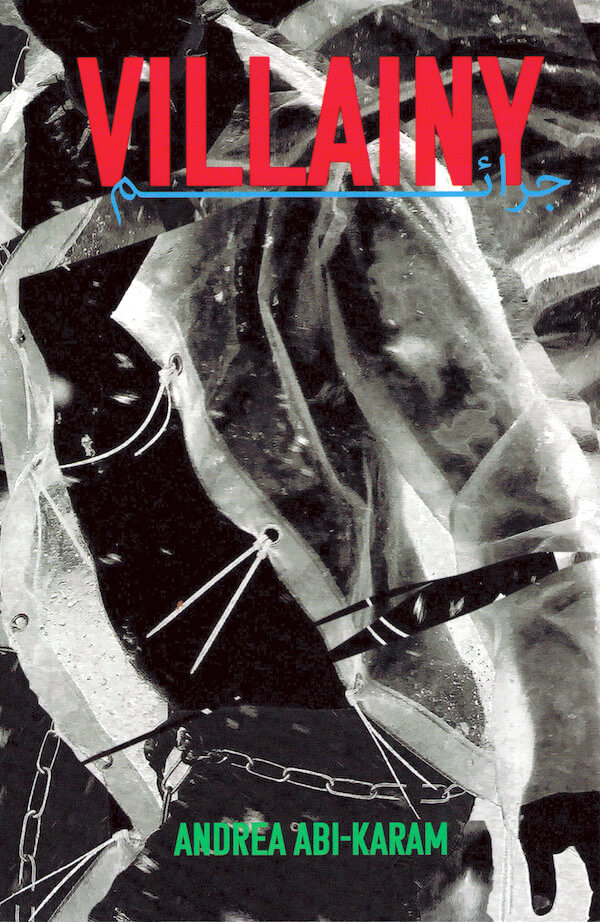
Villainy
Harnessing street protest as a poetic formation, Villainy exhibits the desires that bring queers into public space.
Andrea Abi-Karam answers the call to action for poetry itself to become the radical accomplice it was destined to be in their second book, Villainy. In order to live through the grief of the Ghostship Fire & the Muslim Ban, Villainy foments political action in public spaces, and indexes the various emotional states, such as rage, revelry, fear, grief, and desire to which queers must tend during protest. In scenes loaded with glitter, broken glass, and cum, Abi-Karam insists that in order to shatter the rising influence of new fascism we must embrace the collective work of antifascists, street medics, and queer exhibitionists and that the safety that we risk is reckless and necessary. Disruptive and demanding, these punk poems embody direct action and invite the audience into the desire-filled slippage between public sex and demonstration. At heart, Villainy aims to destroy all levels of hierarchy to establish a participatory, temporary autonomous zone in which the targeted other can thrive.
Published September 2021
Andrea Abi-Karam is an arab-american genderqueer punk poet-performer cyborg, writing on the art of killing bros, the intricacies of cyborg bodies, trauma and delayed healing. Selected by Bhanu Khapil, Andrea's debut EXTRATRANSMISSION (Kelsey Street Press, 2019), is a poetic critique of the U.S. military's role in the War on Terror. Simone White selected their second assemblage, Villainy for publication in Fall 2021 at Nightboat Books. With Kay Gabriel, they co-edited We Want It All: An Anthology of Radical Trans Poetics released by Nightboat Books in November 2020. They are a Leo currently obsessed with queer terror and convertibles.
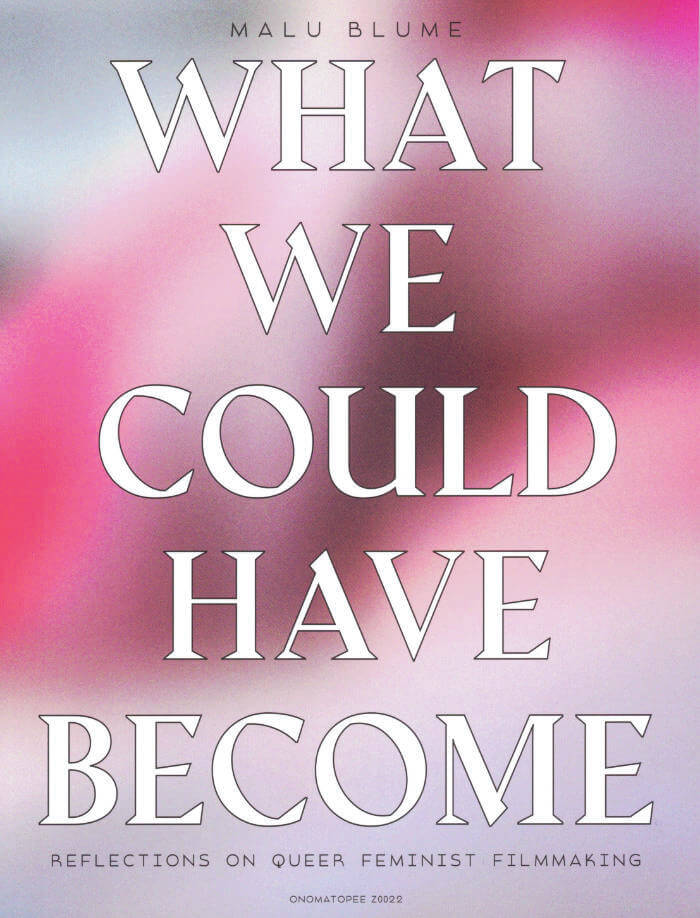
What We Could Have Become
The publication 'What we could have become: Reflections on queer feminist filmmaking' explores the radical potentials of care and speculative fiction in the context of queer feminist collective filmmaking. Departing from the experimental short film The Book of S of I (2020) by Malu Blume, this publication is a documentation of the film project just as much as its own artistic medium. Using a performative mode, it weaves together film stills with unreleased set photography, creating a visual narration that reflects caring and kinship through a queer feminist – and femme – lens.
With a foreword by editor Sascia Bailer, the booklet contains a transcript of the film’s narrative voice over and an essay on queer utopian care in the context of The Book of S of I and its making, both written by the artist Malu Blume. The publication concludes with a conversation between Malu Blume and their co-producers, friends and artistic collaborators Ipek Hamzaoglu, Laura Nitsch and Sophie Utikal, moderated by Sascia Bailer. In this conversation the artists and discuss the chances and challenges of collective film making in the context of producing The Book of S of I.
Malu Blume is a Berlin-based artist who works at the intersections of art, performance, film and education. In 2016 they completed a master's degree in Critical Studies at the Academy of Fine Arts Vienna. Malu Blume has been the co-founder and member of several collective projects on queer feminism, archival politics, friendship and collaborative knowledge production.

Philosophy for Spiders: On the Low Theory of Kathy Acker
McKenzie Wark combines an autobiographical account of her relationship with Kathy Acker with her transgender reading of Acker's writing to outline Acker's philosophy of embodiment and its importance for theorizing the trans experience.
Over the decades readers have found a punk Acker, a feminist Acker, a queer Acker, a kink Acker, and an avant-garde Acker. In Philosophy for Spiders, McKenzie Wark adds a trans Acker.
Wark recounts her memories of Acker (with whom she had a passionate affair) and gives a comprehensive reading of her published and archived works. Wark finds not just an inventive writer of fiction who pressed against the boundaries of gender but a theorist whose comprehensive philosophy of life brings a conceptual intelligence to the everyday life of those usually excluded from philosophy's purview.
As Wark shows, Acker's engagement with topics such as masturbation, sadism, body-building, and penetrative sex are central to her distinct phenomenology of the body that theorizes the body's relation to others, the city, and technology.

The Works of Guillaume Dustan (Vol. 1)
Guillaume Dustan' first three novels, published in French between 1996 and 1998, describing the narrator's sexual odyssey through a Paris still haunted by AIDS.
This volume collects a suite of three wildly entertaining and trailblazing short novels by the legendary French anti-assimilationist LGBTQ+ writer Guillaume Dustan. Published sequentially in France between 1996 and 1998, the three novels are exuberant and deliberately affectless accounts of the narrator's sexual odyssey through a Parisian club and bath scene still haunted by AIDS.
In My Room (1996) takes place almost entirely in the narrator's bedroom. The middle volume, I'm Going Out Tonight (1997) finds him venturing out onto the gay scene in one long night. Finally, in Stronger Than Me(1998) the narrator reflects on his early life, which coincided with the appearance and spread of the AIDS virus in France.
A close contemporary of Dennis Cooper, Brett Easton Ellis, Kevin Killian, and Gary Indiana, Guillaume Dustan's deadpan autofiction is at once satirical and intimate, and completely contemporary.